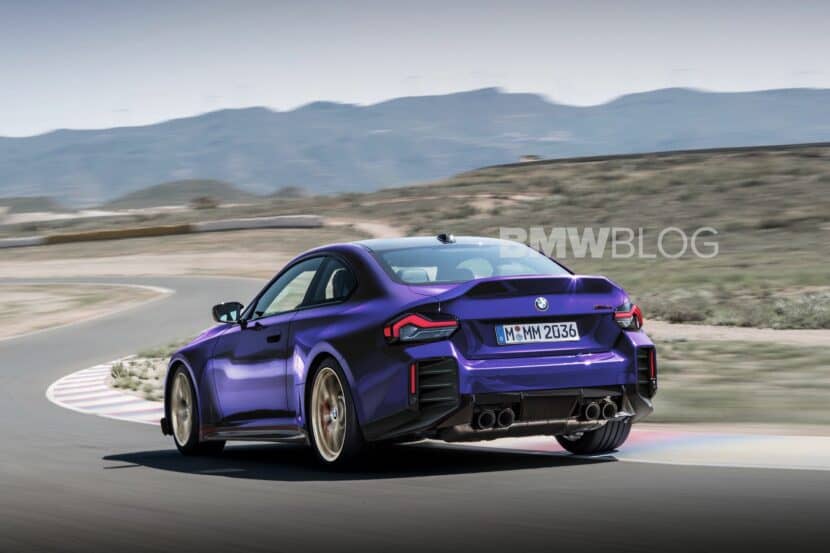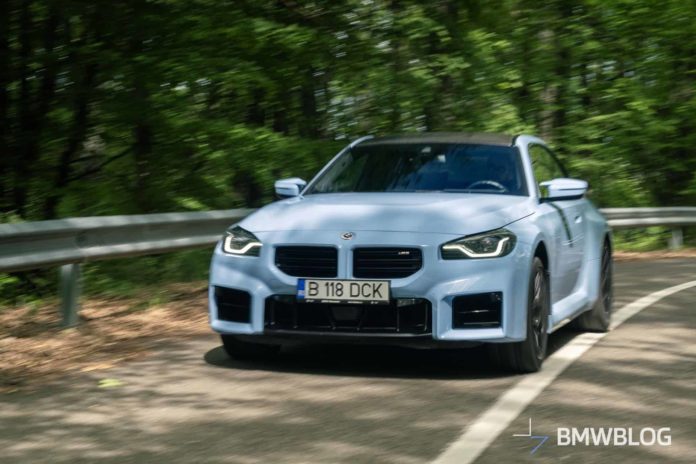BMW makes most of its money these days by selling tall crossovers and SUVs. This isn’t yet true for BMW, thankfully, but given the direction the industry seems headed, as well as the fact that the first bespoke M model is a 2.8-ton SUV, the days of nimble, sporty M sedans and coupes could be numbered. A couple of decades from now, there may not be enough buyers to justify their creation.
Let’s hope I’m wrong and the global car-buying public realizes that you can’t derive anywhere near as much enjoyment from driving an SUV, no matter how well-tuned, stiffly sprung, and powerful it may be, as you can from a sorted sporty low-slung car. Powerful SUVs may be good for accelerating you toward the horizon and scaring your friends, but when you want to string a few bends together briskly, there is nothing like a compact coupe.
BMW has a long history of making some excellent two-door cars, many of which have worn the fabled M badge. In recent years, the manufacturer’s traditional offerings, the M3, M4, and M5 have grown quite big and heavy. Remarkably, they drive as well as they do today, even in spite of their size and heft.
///M Car Magic

Every time I drive a new BMW and throw it around a few corners, I’m always impressed by the fact that those clever engineers in Bavaria have somehow managed to make it feel like a smaller, lighter, and more nimble car. This brings me to a few weeks ago when I took the 2024 BMW M2 G87 to my favorite twisty road, where I had the time of my life. I’ve driven other M models and similarly powerful cars on that road, but the M2 was my favorite.
Good
- Great handling through twisties
- Plenty of power to have fun
- Comfortable suspension
Bad
- Steering a bit numb
- Quite heavy
- Rear passenger comfort
The combination of the G87 BMW M2 and that road reminded me why BMW’s M division is so great. It gave me hope that we will be able to drive cars that are as fun in the future. Its blend of power, sure-footedness, and a wayward character when you want it makes it the perfect driver’s car, good for enthusiasts of all experience and skill levels thanks to its highly customizable driving aids.
Twists and Turns


The 2024 BMW M2 is built on a shortened version of the same CLAR architecture that underpins all of BMW’s rear-wheel-drive models, including the G82 M4. It is exactly the same width as the M4, 74.29 inches without mirrors, and it has identical front and rear track widths. However, it rides on a 108.15-inch wheelbase, which is 4.3 inches shorter than the M4’s and almost nine inches shorter overall.
This not only makes it look very short and wide, with very short overhangs and bulging wheel arches, but it also makes it handle great. The M2 feels like an M4 but more nimble and eager to turn, with the same playful rear end that you can easily slide on corner exit, especially if you disable stability control and set the M traction control slider below half.


The road I chose for this drive winds its way up and then down a densely forested hill, with plenty of sharp turns, crests, and off-camber bends. The M2 feels very secure, even with the rear end that likes to go sideways sometimes. The M2 is a bit wide for this road (which is better suited for a smaller car like a Mazda Miata), so I often found myself going over the center line slightly. Luckily, there’s hardly any traffic on this road during the week, so I encountered only maybe five cars on my entire drive.
Steering Feels Different Than In The BMW M4


One thing that surprised me about the M2 compared to the M4 was the steering feel. For some reason, the M2’s front end seemed more inert, and it didn’t communicate what the front wheels were doing through the steering wheel as well as its bigger brother did. It’s precise and very eager to turn, maybe more so than the M4, but I often found myself wondering how close I was to the limit of grip, a thought that never crossed my mind while driving the larger car on the same road.


It could be the tires, although the M2 has Michelin Pilot Sport 4S tires with the star symbol that signifies they were specially designed for the car. I’m very curious how the car would behave with completely different rubber from another manufacturer and whether this would alleviate some of the steering’s lack of feel.
But this aside, there’s no other car on the market that feels like the 2024 BMW M2. The Toyota GR Supra is close, and maybe even more eager to swing its tail out, but it lacks the M2’s sheer mechanical grip and blistering straight-line performance.
If you’ve driven the G87’s predecessor, the F87, you will notice the new car is heavier and not quite as wild a ride. The G87 is almost 400 pounds heavier than the F87, and while you don’t really notice it most of the time, in some quick left-right direction changes, you do notice there is more mass that shifts from one side to the other.
Interestingly, BMW lists both the M2 G87 and M4 G82 as having the same mass of 3,802 pounds, even though there’s an obvious size difference between them. Why and how BMW made the M2 as heavy as its larger brother remains a mystery, but it does little to dull the driving experience.
Power Aplenty


Powering the G87 is a de-tuned version of the S58 engine that powers the M3, M4, X3M, and X4M. In the M2’s state of tune, it makes 460 horsepower at 6,250 rpm, and peak torque arrives flat from 2,650 rpm to 5,870 rpm. It feels exceptionally muscular, and even if you start accelerating in a higher gear from low rpm, it picks up and swiftly surges to the red line.
It’s rewarding to rev the engine past 7,000 rpm (it has a 7,200 rpm rev limit) since it doesn’t seem to run out of puff after the point where peak power is achieved. This is thanks to the use of a twin-turbo setup, which allows one turbo to provide muscular low-down feel as well as a strong top end.


You do feel that it powers a vehicle that is as heavy as an M4 but with less power, and in a straight line, it’s noticeably slower than the 510-horsepower M4, which also has more torque. However, on a twisty road like the one I tested it on, the difference is barely noticeable, and I couldn’t wipe the smile off my face throughout the drive. It’s a special engine that even in Europe, where it’s equipped with a particulate filter, which dulls the exhaust noise somewhat, it’s still fun to listen to and loud enough for others to know you’re driving something a little bit special.
BMW says that you can expect it to use about 24 mpg mixed, calculated on the WLTP test cycle, and that seems almost achievable in mixed driving conditions in the real world. If you drive it without accelerating hard, you can even see it hit 30 mpg on the open road. During my drive—I went through almost three full tanks in a few days—the average consumption was about 14 mpg.
The Practical Stuff


One big criticism of the previous-generation BMW 2 Series and F87 M2 was that they didn’t have enough room for adults in the back. This has been addressed for the new model, which allows you to transport people in the rear seats without having them think you’re subjecting them to some kind of torture technique.
Driving up to the twisty road from Bucharest, about 70 miles away, there were four of us in the car, and nobody complained. Sure, it’s not the most comfortable experience for rear passengers, but they won’t hate you for putting them there. You can also fit most of their bags in the trunk too, which can accommodate 13.8 cubic feet or 390 liters of stuff.
On the drive to the twisty road, I was also pleasantly surprised by how comfortable the G87’s suspension is. The adaptive dampers in their softest setting made me forget that the car has 19-inch wheels in the front and 20-inch wheels in the rear. Even when going over larger imperfections and potholes, the car never felt like it was crashing or like the bump stops were being reached—it’s a much more accomplished grand tourer than the F87.
The Best Is Still to Come


BMW has not released any special M2 variants based on the latest model, and it’s already almost as quick as the swan song of the last generation, the M2 CS. But BMW will surely bring some special G87 variants to market in the future, and they are bound to make an already great car even better with more power, more track focus, and changes to the exterior and interior design.
Hopefully, more aggressive future versions will also shed some of that M4 weight to bring back more of the F87’s nimble character. Hopefully, some of these hotter versions of the M2 will be offered with the excellent six-speed manual gearbox and possibly a shorter differential ratio to make the in-gear surge feel more relentless. We’re expecting the next M2 CS to debut sometime in 2025, but it’s reportedly not coming with a manual gearbox. Let’s hope it’s not the only special BMW M2 variant that is yet to come.
Exterior Appeal – 7.5
Interior Quality – 8
Steering Feedback – 8
Performance – 8.5
Handling – 8.5
BMWness/Ultimate Driving Machine – 8
Price Point – 8
8.1
BMW has not released any special M2 variants based on the latest model, and it’s already almost as quick as the swan song of the last generation, the M2 CS.

